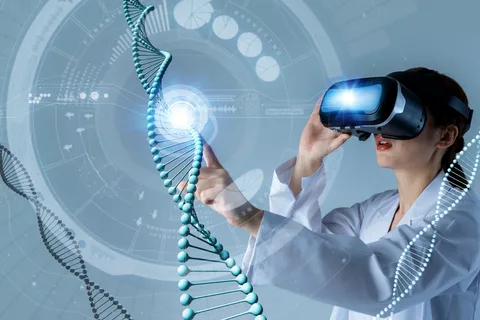Biotechnology has emerged as a transformative force in healthcare, revolutionizing medical treatments, diagnostics, and the overall approach to patient care. In this article, we will delve into the historical evolution, current applications, and the future prospects of biotechnology in the healthcare sector.
Introduction
Biotechnology in healthcare represents a marriage of biology and technology, opening new frontiers in medical science. The integration of genetic research, molecular biology, and advanced technologies has paved the way for groundbreaking innovations, promising a future where diseases are not just treated but understood at their core.
Historical Evolution of Biotechnology in Healthcare
The journey of biotechnology in healthcare can be traced back to key milestones in the understanding of genetics, the discovery of DNA’s structure, and the development of recombinant DNA technology. These breakthroughs laid the foundation for the production of insulin through genetic engineering and the advent of biopharmaceuticals.
Current Applications of Biotechnology in Healthcare
Gene Therapy and Personalized Medicine
Biotechnology has enabled the development of gene therapies tailored to an individual’s genetic makeup, offering targeted treatments for various genetic disorders. Personalized medicine, driven by genetic insights, is revolutionizing cancer treatment and other diseases.
Biopharmaceuticals and Vaccine Development
The production of biopharmaceuticals using living organisms has become a standard in healthcare. Biotechnology plays a crucial role in vaccine development, ensuring rapid responses to emerging infectious diseases.
Diagnostic Tools and Imaging Technologies
Advanced diagnostic tools, such as genetic testing and molecular imaging, are enhancing early disease detection. Biotechnology contributes to the development of more accurate and personalized diagnostic methods.
Emerging Trends in Biotechnology
CRISPR Technology and Its Potential
CRISPR-Cas9 technology allows precise gene editing, holding immense potential for treating genetic diseases. The ethical implications and regulatory challenges surrounding CRISPR are areas of ongoing debate.
Nanotechnology in Healthcare
Nanotechnology is making waves in drug delivery systems and imaging technologies, enabling targeted treatments with minimal side effects. The use of nanoscale materials is reshaping the landscape of medical interventions.
Read More:
Artificial Intelligence in Biomedicine
The marriage of artificial intelligence and biomedicine is enhancing data analysis, drug discovery, and patient care. Machine learning algorithms are helping identify patterns in large datasets, leading to more effective treatments.
Challenges and Ethical Considerations
While the promise of biotechnology in healthcare is vast, it comes with challenges and ethical considerations. Privacy concerns in genetic testing, ethical debates surrounding gene editing, and the need for robust regulatory frameworks are pressing issues that require careful consideration.
The Integration of Biotechnology and Traditional Medicine
A harmonious integration of biotechnological advancements and traditional medicine can offer holistic healthcare solutions. Both modern and traditional approaches can complement each other, providing patients with a comprehensive and personalized healthcare experience.
Global Impact of Biotechnology on Public Health
The impact of biotechnology extends globally, with advancements in medical treatments becoming more accessible. Biotechnology plays a pivotal role in addressing global health challenges, contributing to the development of solutions for infectious diseases and chronic conditions.
Future Prospects and Innovations
The future of biotechnology in healthcare holds exciting prospects. Advancements in stem cell research, the application of bioinformatics in personalized medicine, and the integration of robotics in medical procedures are poised to redefine healthcare standards.
Investments and Funding in Biotechnological Research
The growing interest from both corporate entities and government initiatives is fueling the biotech industry’s growth. Investments in biotechnological research are driving innovation, leading to breakthroughs in medical science.
Educational and Career Opportunities in Biotechnology
The increasing demand for biotech professionals opens up educational and career opportunities. As the field expands, educational programs cater to the need for skilled individuals, offering diverse career paths in research, development, and implementation.
Environmental Impacts of Biotechnological Advancements
Sustainable practices in biopharmaceutical production and reduced ecological footprints are becoming priorities in the biotech industry. Addressing environmental impacts ensures that advancements benefit not only patients but the planet as well.
Collaboration in the Biotech Ecosystem
Interdisciplinary collaboration is essential for driving innovation in the biotech sector. Networking and partnerships between researchers, industries, and institutions foster a dynamic ecosystem that accelerates progress.
Public Perception of Biotechnology in Healthcare
Understanding and addressing public concerns regarding biotechnological advancements are crucial. Clear communication about the benefits of biotechnology, along with transparency about potential risks, helps build trust and acceptance.
Regulatory Framework and Governance
Establishing a robust regulatory framework is imperative to ensure the safety and ethical standards of biotechnological applications. Government regulations play a crucial role in guiding the responsible development and deployment of biotech solutions.
Conclusion
In conclusion, the future of biotechnology in healthcare is bright and promising. From personalized medicine to groundbreaking innovations, biotechnology continues to redefine the landscape of healthcare. As we navigate the ethical challenges and regulatory landscapes, the transformative power of biotechnology holds the potential to bring about a healthier and more resilient world.
FAQs
- How does biotechnology impact personalized medicine?
- Biotechnology enables the development of targeted treatments based on an individual’s genetic makeup, revolutionizing personalized medicine.
- What are the ethical considerations surrounding gene editing with CRISPR technology?
- The use of CRISPR technology raises ethical concerns related to potential unintended consequences and the modification of human germline cells.
- How is nanotechnology reshaping drug delivery in healthcare?
- Nanotechnology allows for precise drug delivery, minimizing side effects and improving the effectiveness of treatments.
- What role does artificial intelligence play in biomedicine?
- Artificial intelligence enhances data analysis, drug discovery, and patient care by identifying patterns and optimizing processes.
- How can the biotech industry address environmental concerns?
- The biotech industry is adopting sustainable practices to reduce its ecological footprint, ensuring advancements benefit both patients and the environment.
